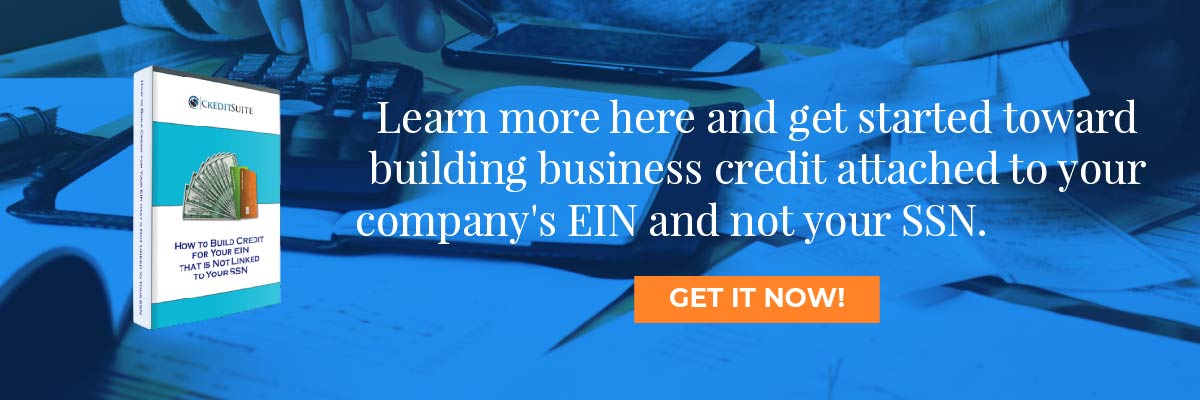- Connect With Us!
- (877) 600-2487
- info@creditsuite.com
Your Amazing Question: What Is a Business Credit Score?
Published By Janet Gershen-Siegel at May 28th, 2018
What is a Business Credit Score? We Put Our Research Ninjas to Work and Here is What They Learned
So does your company have an epic company credit score? Or it is any good at all? So you are presently in business, and you wondering: just what is a business credit score?
So you are working hard to keep on top of your company credit scores.
Or maybe you are not, and have determined now is a good time to start. Or perhaps your company is somewhat new, and this is the first time you’re doing this.
Regardless of your scenario, you’ve most likely asked this question at least once. Are my credit ratings any good?
So let’s have a look at the three company credit reporting bureaus. And we’ll solve this mystery once and for all.
What is a Business Credit Score? Check Your Scores!
Your best option as a company owner is to stay on top of your small business credit reports from PAYDEX, Equifax, and Experian.
There are three big credit reporting bureaus for companies and you really need to check all three of them frequently. This is because they use moderately different touchstones. Hence moving the needle for one can move the needle for both of the others. Bet perhaps not as much.
Do not permit your company credit scores slide, because you must catch any mistakes as quickly as you can. As well as, you need to catch anything which is dragging your scores down.
Keep On Top Of Your Scores
And afterwards you can take remedial steps. You can get your reports easily and stay right on top of all three scores by following a few straightforward steps.
What Is a Business Credit Score? A Business’s Experian Company Credit Score
Experian’s Credit Score report includes a commercial credit score along with additional details, such as account histories, payment trends, and public records. Experian company credit scores run the gamut from 1 to 100.
Unlike Dun & Bradstreet’s PAYDEX score and Equifax’s payment index, Experian takes into consideration a variety of factors, and not merely payment histories.
Experian Scoring Factors
The elements that go into the calculation include:
- Lines of credit your business has an application for in the last nine months
- New lines of credit you’ve begun in the previous six months
- Your small business’s years in business
- Payment history in the prior twelve months
More Experian Scoring Factors
- Lines of credit in use in the past six months
- Collections totals within the prior seven years
- Percent of available credit in use
- Amount of payments one – 30 days late, or 31 days or more late
- Number of non-net-30 lines of credit (that means the payment is due in less or more than 30 days).
Ordinarily, even businesses which use credit conscientiously will get a medium-low risk rating. As you might expect, older companies will have a much easier time acquiring a low-risk rating.
An epic Experian score for your company is 76-100.
Checking Your Reports at Experian
Experian, another big credit reporting company, also provides a method for obtaining reports sent to you for a cost. For this reason you can keep an eye on your Experian business credit score here and the setup is effortless.
However, if you would rather not get continuing reports (and purchase them), then you can order an individual Experian report for your small business on their site.
Additionally, if there are any problems or issues, you can contest any errors on your small business’s Experian report if you follow the directions on their website.
Learn more here and get started toward building business credit attached to your company’s EIN and not your SSN.
What Is a Business Credit Score? A Business’s PAYDEX Score
Dun & Bradstreet’s PAYDEX score runs from 0 to 100. A PAYDEX score has a basis in payment data which is on report to the bureau. Or it is on report to data-gathering companies partnering with the credit reporting agency.
D & B uses this data, along with a credit score and financial stress score, so as to recommend how much credit a credit issuer should extend to your business.
Getting a PAYDEX Score
To get a PAYDEX number, you must file for a DUNS number via Dun & Bradstreet’s web site. The number is free. In addition the bureau needs to have records of your payments with four or more merchants.
Your small business’s PAYDEX score reveals if your payments are typically made in a timely manner or ahead of schedule. As you may expect, a greater number is better.
PAYDEX Score Details
The scores break down as follows:
- 80-100: A low risk of late payments
- 50-79: A medium risk of late payments
- 49: A high risk of late payments
Business Credit Score
Your company’s credit rating runs from 1 to 5. 1 is the best score. This matches your small business with other small businesses with similar payment histories. The figure demonstrates how frequently those companies tend to pay timely.
This information can really help credit issuers to comprehend your business’s standing.
But it does not truly show all of the payment records from your business
Financial Stress Score
The financial stress score also ranges from 1 to 5. This score matches your business with other companies sharing comparable financial and business properties.
These similarities are in areas such as size or amount of time in business. This score demonstrates how frequently those companies tend to pay on time. As before, 1 is the best score. This rating is a more comprehensive evaluation of the business landscape, rather than analysis of your company’s genuine payment history.
An epic PAYDEX score for your small business is 80-100.
DUNS Numbers
To get a PAYDEX number, you are required to file for a DUNS number by using Dun & Bradstreet’s website. The number is free. In addition the CRA will need to have records of your payments with four or more merchants. Your small business’s PAYDEX score indicates if your payments are commonly made on schedule or ahead of schedule. As you may expect, a greater number is better. The scores break down as follows:
- 80-100: A low risk of late payments.
- 50-79: A medium risk of late payments.
- 0- 49: A high risk of late payments.
Checking Your Reports at D&B (PAYDEX)
Dun & Bradstreet’s PAYDEX score of your small business can end up being among the main reasons that your small business gets credit in any way.
D & B provides Credit Signal, which is a way to monitor your credit score by having the reports come directly to you, for a cost. You may discover the fee is well worth it to avoid the headaches that can arise from letting this score slip.
And you will not have to produce and stay on top of the organizing and reminders you might need to keep up with if you do not use it.
Alternatives to Credit Signal
Don’t wish to utilize Credit Signal? No problem, as you can obtain your PAYDEX report via D & B and, if need be, you can speak with their Customer Service department (this department exists as a section of Dun & Bradstreet itself).
Now in order to review your PAYDEX report, check out what D & B provides, which is a specimen report and even some higher level direction in the way to read it.
What Is a Business Credit Score?
Equifax shows three distinct business determinations on its commercial credit reports. These are the Equifax payment index, your business’s credit risk score, and its business failure score.
Learn more here and get started toward building business credit attached to your company’s EIN and not your SSN.
Equifax Payment Index
Much like the PAYDEX score, Equifax’s payment index, which has its measurement on a scale of 100, shows how many of your business’s payments were made punctually. These include both information from credit issuers and vendors.
But it’s not meant to anticipate future actions. That is what the other two scores are for.
Equifax Credit Risk Score
Equifax’s credit risk score checks how likely it is your business will become severely delinquent on payments. Scores run from 101 to 992, and they determine:
- Available credit limit on revolving credit accounts, e. g. credit cards
- Your company size
- Proof of any non-financial transactions (e. g. vendor invoices) which are unpaid or were on charge off for two or more billing cycles
- Amount of time since the opening of the oldest financial account
Equifax Business Failure Score
Lastly, Equifax’s business failure score takes a look at the chance of your company shutting down. It runs from 1,000 to 1,600, reviewing these elements:
- Total balance to total current credit limit average utilization in the past three months
- How much time since the opening of the earliest financial account
- Your business’s worst payment status on all trades in the previous 24 months.
- Documentation of any non-financial transactions (e. g. merchant invoices) which are late or have been on charge off for two or more billing cycles.
Equifax Scoring Analysis
So for the credit risk and the business failure scores, a score of 0 means bankruptcy.
A terrific Equifax score for your company is as follows:
- Payment Index 0-10
- Credit Risk score 892-992
- Business Failure score 1400-1600
So keep your numbers up and good things will happen.
Checking Your Reports at Equifax
Equifax, one of the major credit reporting agencies, supplies a risk monitoring service which is more convenient as it permits reports to go directly to you. But if you don’t want to purchase continual reports, you can as an alternative order your business’s Equifax report.
On top of that, if you want to question your company’s Equifax report, you can do so by adhering to the information on their website.
Learn more here and get started toward building business credit attached to your company’s EIN and not your SSN.
What Is a Business Credit Score? Takeaways
In certain cases, it is a good idea to hand over a few dollars so as to be sure you obtain your business credit reports routinely. It’s a lot more convenient than to have to remember to do this. And you’ll probably peruse these reports more carefully, as they come at a cost.
So continue to track and use the tools that these credit reporting agencies offer, and make your life less complex. Since it goes without saying; you’ve already got enough on your plate.
Thanks to the recent data breach, there are all the more reasons to go over your business and individual credit reports, and be vigilant about any errors you identify.
So keep your scores in line and good things will happen. Learn more here and get started toward building business credit attached to your company’s EIN and not your SSN. And you will be able to answer the question: what is a business credit score?

 " class="attachment-blog-single size-blog-single wp-post-image" alt="Get Business Credit Cards for New Businesses Credit Suite-Business Line of Credit Decoded" title="Get Business Credit Cards for New Businesses">>
" class="attachment-blog-single size-blog-single wp-post-image" alt="Get Business Credit Cards for New Businesses Credit Suite-Business Line of Credit Decoded" title="Get Business Credit Cards for New Businesses">>